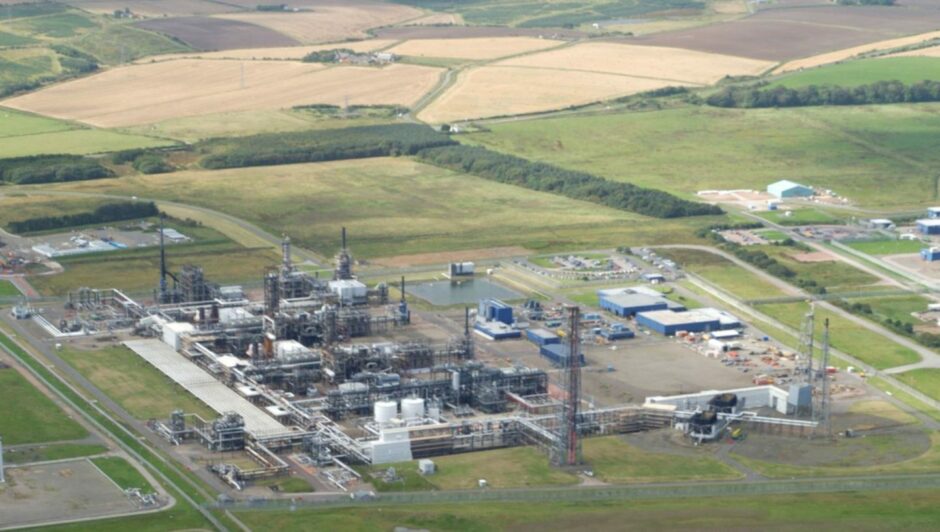
A project that promises to deliver thousands of north-east jobs as well as ensure Scotland meets its net zero targets will happen “as soon as practical”, despite losing out its first bid for UK Government funding last year.
This was the view set out by Alan James at an event in Aberdeen who said it was “not a matter of if, it is simply a matter of when” the Acorn carbon capture and storage (CCS) project would go ahead.
But the Aberdeen and Grampian Chamber of Commerce (AGCC) wants to speed up the plans and has today issued a demand that Chancellor Rishi Sunak to “put right the wrong” and set out a timeline for the Scottish Cluster in his Budget statement this week.
Mr James is a co-founder and chief technology officer of Storegga, which is a key partner of a portfolio of carbon capture and hydrogen production proposals known as the “Scottish Cluster”.
The heart of the cluster is known as Acorn, which takes in key facilities across the north-east including the port and the St Fergus gas terminal in Peterhead, as well as former oil and gas pipelines and North Sea geographical features that are expected can be used to store CO2 permanently and safely.
Huge dismay met the UK Government’s decision to snub the north-east in a £1 billion funding competition last year which saw rival projects in “red wall” constituencies in the North of England awarded instead, leaving the Scottish Cluster, led by Acorn, as a so-called “reserve cluster“.
Mr James said the Acorn project, which is backed by partners including Shell UK and Harbour Energy, was unique in that it offered 30% of the UK’s capacity for CO2 storage.
Technology like a carbon damage ‘time travelling machine’
Further, it also includes the deployment of “direct air capture” (DAC) technology which he said was like a “time travelling machine” – to go “back in time and repair some of the damage society has done over the years through emitting CO2”, he said.
Speaking at a conference on the future of the city at the P&J Live, Mr James admitted the government procurement process had been “disappointing”.
“We were frustrated not only for ourselves and our project but also for communities and the number of jobs we were looking to create in the sector here could be more than 15,000 jobs directly around Scotland to support this new CCS industry,” he said.
“We are disappointed the Government couldn’t stretch to having three initial CCS clusters in the UK.
“But the good news is we are a reserve cluster.
“We are in conversation with government every single week
“It is not a matter of if, it is simply a matter of when this moves forward at pace and starts to operate.”
He added: “We are very hopeful we can continue to press forward with the project which is continuing now and brining it into operation as soon as practical.”
Mr Sunak will unveil a spring budget on Wednesday with hopes that he might unveil some measures to ease the cost of living crisis that is engulfing households across the UK as well as resist the temptation to bring in a wind-fall tax on oil and gas operators that have been making huge profits on the back of global oil and gas price hikes.
Prime Minister Boris Johnson is also expected to announce new oil and gas exploration in his energy review later this month in order to reverse shortage fears and spiralling costs of oil and fuel as Western economies impose sanctions on Russia due to its invasion of Ukraine.
Russell Borthwick , chief executive of AGCC, said the business group has asked that any move to maximise North Sea production is matched with low carbon ambition by funding the Scottish Cluster.
He said: “It is important that while tackling the energy supply issues of today, our policy makers don’t drop the ball with our energy transition.
“The Climate Change Committee has said that up to five clusters will be required for us to meet our climate targets, so why are we stopping at two for now?
“Businesses in the north-east are fully bought-in to the energy transition and what we now need is a timeline for this crucial part of our low carbon future to be delivered.
“The Acorn project, with its established infrastructure and its accelerated timeline for delivery, is one of the many reasons why Scotland was a standout location to be amongst the first UK clusters.
“The UK Government chose a different direction, but with a fresh energy strategy in the pipeline, now is an opportune moment to right that wrong and outline a clear timeline for delivering what would be a transformational project for Scotland.”
Recommended for you

 © Chris Sumner/DCT Media
© Chris Sumner/DCT Media